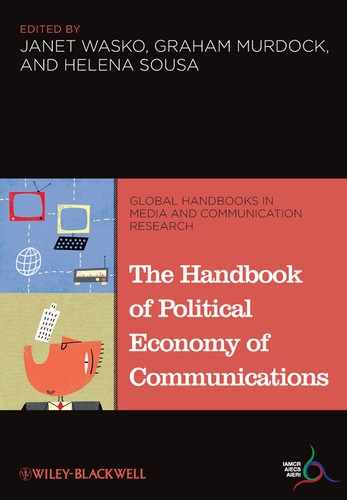0%
42Chapters
0-1Hours read
0kTotal Words
Book Description
Over the last decade, political economy has grown rapidly as a specialist area of research and teaching within communications and media studies and is now established as a core element in university programmes around the world. The Handbook of Political Economy of Communications offers students and scholars a comprehensive, authoritative, up-to-date and accessible overview of key areas and debates.
Combines overviews of core ideas with new case study materials and the best of contemporary theorization and research
Written many of the best known authors in the field
Includes an international line-up of contributors, drawn from the key markets of North and Latin America, Europe, Australasia, and the Far East
Table of Contents
- Cover
- Series page
- Title page
- Copyright
- Notes on Contributors
- Series Editor's Preface
- Acknowledgments
- Introduction: The Political Economy of Communications
- Part I Legacies and Debates
- 1 Political Economies as Moral Economies
- 2 The Political Economy of Communication Revisited
- The Development of the Political Economy of Culture
- The Culture Industries, Cultural Labor, and the Cultural Commodity
- The Cultural Commodity and Cultural Demand
- From the Political Economy of Culture to the Political Economy of Information
- The Political Economy of the Information Society (PEIS)
- Telecommunications and the Culture Industries
- Information Economics
- Technologies of Freedom and the “Third Wave”
- The Information/Copyright/Creative Industries as the New Growth Sector
- Conclusion
- 3 Markets in Theory and Markets in Television
- Markets and the Liberal Market Model
- Defining Markets: Legal Basis
- Defining Markets: Economic Relationships and Capable Entities
- Defining Markets: Institutional Structures
- Measuring Audiences for National Networks: The US Market for Ratings
- The Right to Reproduction: The Global Market for Television Formats
- Conclusion
- 4 Theorizing the Cultural Industries
- 5 Communication Economy Paths
- Part II Modalities of Power
- 6 The Media Amid Enterprises, the Public, and the State
- 7 Media Ownership, Concentration, and Control
- Introduction
- The Hutchins Commission Report (1947)
- Herbert Schiller: Worldwide US Media Monopoly? (1969–2000)
- Murdock and Golding, “For a Political Economy of Mass Communications” (1973)
- Ithiel de Sola Pool: Technologies of Freedom (1983)
- Herman and Chomsky, Manufacturing Consent (1988/2002)
- Benjamin Compaine and Douglas Gomery, Who Owns The Media? (2000)
- Gillian Doyle, Media Ownership (2002)
- Ben Bagdikian’s The Media Monopoly (1983–2004)
- C. Edwin Baker, Media Concentration and Democracy: Why Ownership Matters (2007)
- International Dimensions and a Provisional Conclusion
- 8 Maximizing Value
- 9 Economy, Ideology, and Advertising
- 10 Branding and Culture
- 11 Liberal Fictions
- 12 The Militarization of US Communications
- 13 Journalism Regulation
- Part III Conditions of Creativity
- 14 The Death of Hollywood
- 15 The Political Economy of the Recorded Music Industry
- 16 The Political Economy of Labor
- The Labor Blind Spot
- Organizational Communication and Labor
- The Laboring of Culture
- Labor Enters the Political Economy of Communication
- The History of Communication from a Political Economy Perspective
- Labor Union Convergence
- Social Movement Worker Organizations
- Toward a Global Labor Movement: Will Communication Workers of the World Unite?
- 17 Toward a Political Economy of Labor in the Media Industries
- Part IV Dynamics of Consumption
- 18 From the “Work of Consumption” to the “Work of Prosumers”
- 19 The Political Economy of Audiences
- 20 The Political Economy of Personal Information
- Introduction
- Theories of Value
- Unpaid Labor
- The Labor of Consumption
- The Valuation and Pricing of Intangibles
- The Valuation of Personal Information
- Estimating the Value of PI at its Origin
- Negative Value, or Consumer Sensitivity
- Willingness to Pay as a Source of Valuation
- The Capture of PI
- Markets in Personal Information
- Tomorrow’s Market
- 21 The Political Economy of Political Ignorance
- Part V Emerging Issues and Directions
- Name Index
- Subject Index
